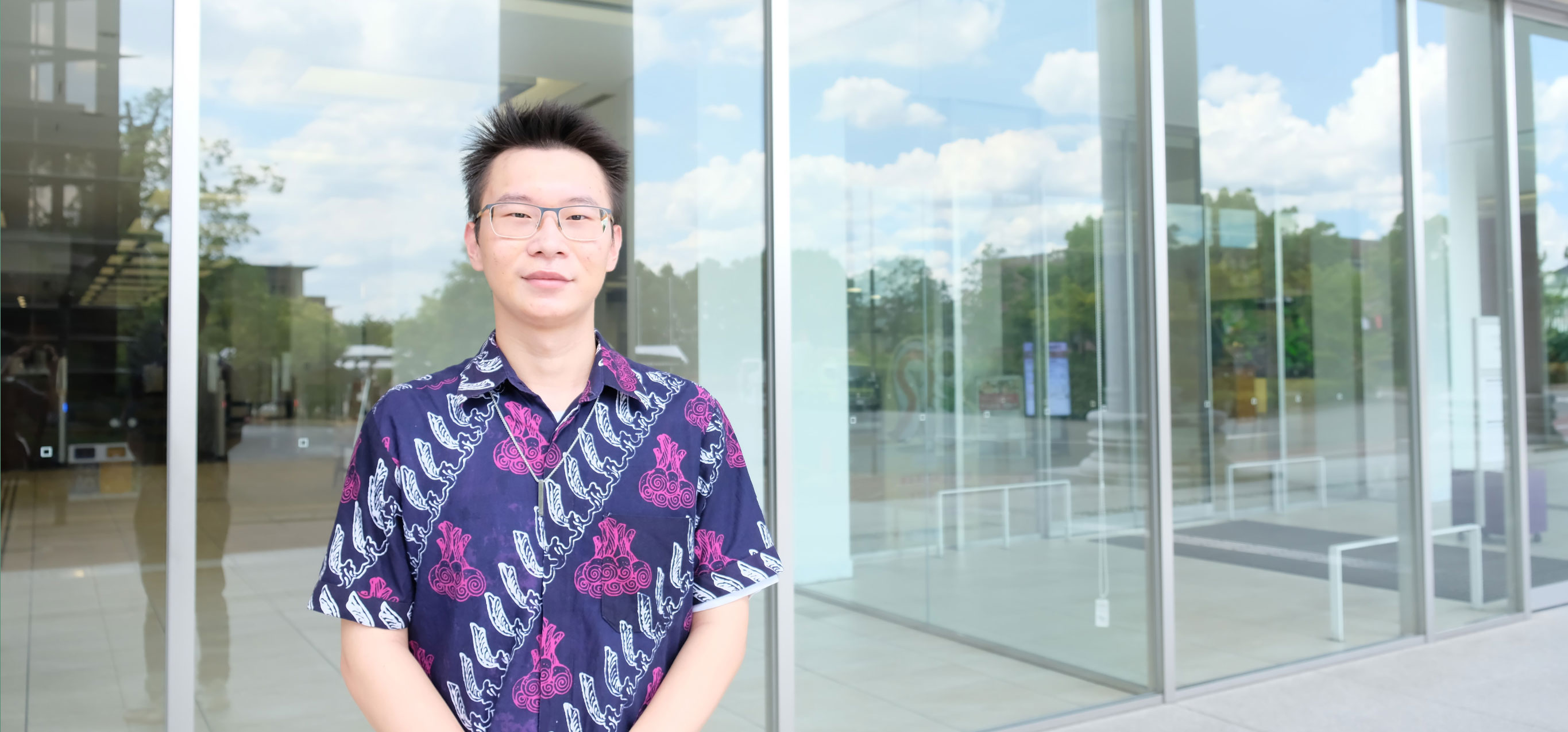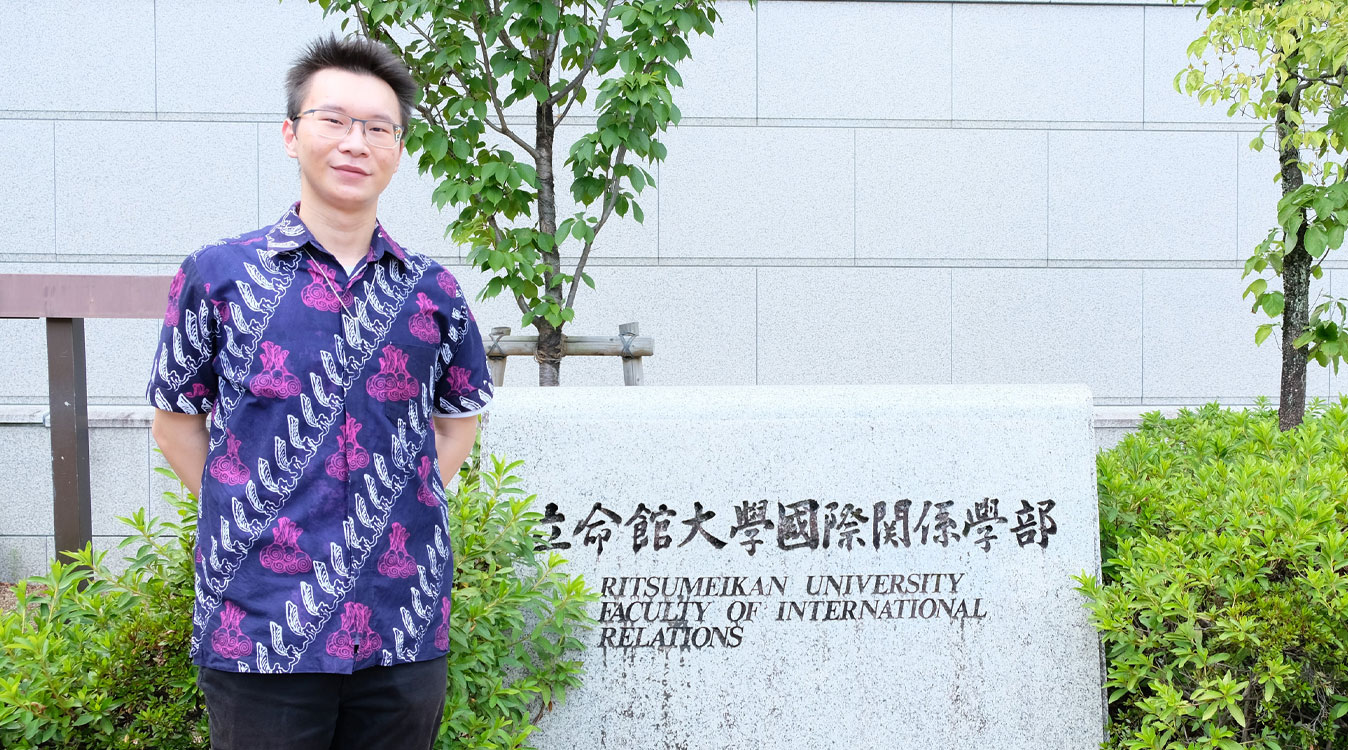
Global Studies major provides unique and meaningful ways to enrich students' learning process and opportunities to develop themselves.
IVAN Dwi Gunawan
Third-year Global Studies Major
We interviewed IVAN Dwi Gunawan, a third-year Global Studies major student who was awarded the Saionji Memorial Scholarship, about the Advanced Seminar, the Asia Cup Moot Court Competition 2023 and his life as a Global Studies student.
What motivated you to apply to the College of International Relations, Ritumeikan University, and what did you want to learn in International Relations before enrollment?
IvanI first heard about Ritsumeikan University's International Relations program during an education fair at my high school in my first year. However, as a first-year Mathematics and Natural Science student, it is only natural that my interest in International Relations only grew later in high school. I was an active member of my school's English Debate club and got the opportunity to participate in a full of competitions up to the national level. This sport introduced me to researching and academically debating various domestic and international affairs with issues ranging from geopolitics to gender equality. Conflicts between states like India and Pakistan, China's Belt and Road Initiative, and minority representation in movies were a few of the many interesting issues I encountered as a debater. As I grew fond of discussing these issues, I wanted to deepen my understanding of the world, and further develop my logical and critical thinking skills by pursuing my bachelor's degree in International Relations.
Fortunately, my high school immediately recommended that I should apply to Ritsumeikan University's College of International Relations after I expressed my interest in taking International Relations. I soon realized it all came full circle with the education fair I attended in my first year. Also, I could never pass out the opportunity to study in Kyoto, Japan. I wanted to study IR in Japan while being immersed in the beauty of Kyoto and also learning from Japanese culture and society. In International Relations, I was initially interested in learning about security issues like conflicts in Kashmir and the Israel-Pakistan conflict and a deeper understanding of International Relations theories to improve how I analyze other issues. However, after studying here for three years, it is a pleasant surprise to know I eventually obtained more knowledge in various other issues and elevated my interests in other fields like society and law. Recently, I have found a particular interest in critical International Relations theories, global environmental justice, and gender issues.
What attracts you to study Global Studies?
IvanAfter going over the Global Studies program, I was immediately hooked. I saw how applying to the Global Studies program would allow me to use English as the primary language in studying and also to learn Japanese through classes and by living in Japan. Furthermore, I have always wanted to study in a global environment where I can meet various students from around the world. The Global Studies program embodies diversity, providing a multitude of meaningful perspectives in class and outside class brought by its diverse student body. I was also captivated by the Global Studies program's amazing set of instructors with international backgrounds in various fields. Moreover, I saw how the curriculum fits my interests, and some parts were unique and attractive. For instance, I was very curious about Global Simulation Gaming (GSG), an event where students do role-play as international actors, engaging in negotiations, cooperation, and policy-making. Ultimately, I found that the Global Studies major provides unique and meaningful ways to enrich students' learning processes that we do not often see in other programs.
How did you work on the Asia Cup Moot Court Competition (an annual international law moot court competition contains issues pertaining to public international law and international human rights etc.) 2023?
IvanInitially, international law was not at the top of my list of things to focus on in International Relations. However, I was invited to participate in a Mock Moot Court event as a regular practice between the College of International Relations's international law zemi and Ritsumeikan APU's zemi. Afterward, I was given the opportunity to join the Asia Cup Moot Court Competition 2023. As novices at moot court competitions, my fellow teammates and I had to work twice as hard. Throughout spring break, we learned the basics of international law, mainly regarding the International Court of Justice (ICJ). This competition differed from the Mock Moot Court I had experienced because the latter focused on the International Criminal Court (ICC).
Then, we divided ourselves into two teams: the Applicant and the Respondent. I was in the Applicant team. The problem covered by this year's competition concerns states' jurisdictional immunities. I had to defend a fictional state that claimed that its jurisdictional immunities were violated. The first phase of the competition involves writing the memorial to be submitted to the court. We had weekly meetings to research and write the memorial, studying countless court cases, reading multiple commentaries on international law, and constructing the perfect argument for our memorial.
Although we did not make it to the oral rounds, we had an enjoyable and valuable experience researching and writing about the jurisdictional immunities of a state. I am grateful for the meaningful learning experience with the team, especially the knowledge and skills passed down by our amazing coach and seniors. Moreover, we still have chances to improve and participate in future competitions.
Regarding your activities in the Advanced Seminar, what topic do you intend to work on for your graduation thesis?
Ivan For my graduation thesis, I am focusing on Chinese Indonesians in Indonesia, a community I am a part of. I initially wanted to study their identity formation in the 21st century. I am fortunate to join such an amazing Advanced Seminar class, which has introduced me to many fascinating and useful theories and concepts in International Relations. In applying the theories learned, namely postcolonialism, I intend to critically analyze how the colonial era shaped the identity of Chinese Indonesians vis-á-vis the rest of Indonesian society. I aim to study how the pre-colonial heterogeneity of the Chinese in the Indonesian archipelago was masked under a dichotomy established by Dutch colonial rule and preserved throughout the post-colonial era. In doing so, I hope to find ways to challenge the maintained perceptions of difference that have caused various instances of discrimination toward Chinese Indonesians to enhance inter-ethnic solidarity in a country as diverse as Indonesia.
Any messages from you to the future students in the College of International Relations?
IvanIf you are searching for a place to study International Relations with the opportunity to comprehensively enhance your academic research and writing skills while delving into a diverse set of topics and global issues, then International Relations at Ritsumeikan University is perfect.
The College of International Relations provides a great range of focuses within its curriculum and many chances to grow as a student, ranging from its regular events like Global Simulation Gaming or the Zemi Research Convention to Writing Tutorials and many other opportunities to develop yourself and have enjoyable experiences. So, you do not have to worry about anything when entering as an International Relations student here. It really feels like everyone can find their footing here, regardless of their interests, focuses, or even pace. And, hopefully, you will find yours too.

September 2023
MORE INTERVIEWS
-
Bridging Japan and the US through International Relations and Language – My Four Years in the JDP and My Global Future
INADA Mimi
Fourth-year Joint Degree Program (RU-home)2025.2.25
studentlife|academics|studyabroad|jdp|
-
While technical knowledge and job-required skills can be learnt after being on the job, some skills, such as communication, presentation, data analysis, and visualization, are the skills I was able to learn from my time at Ritsumeikan.
Pranjal Modi
RIMOWA (Global Studies Major Alumnus 2022)2025.2.4
alumni|
-
Zemi Research Convention 2024“The Integration of Human Rights into International Environmental Law and its Implications”
Ochi Seminar
(team name: Environmental Justice Analysts)2025.1.6
academics|openseminar|
-
Zemi Research Convention 2024“Are Israel's actions in Palestine considered self-defence”
Ochi Seminar
(team name: The Prosecutors)2024.12.25
academics|openseminar|
-
This supportive community empowers you to step out of your comfort zone and take on numerous challenges throughout your university life.
SUZUKI Tomoya
SAP (International Relations Major Alumnus 2018)2024.12.11
alumni|
-
Surrounded by diversified nationalities of colleagues and external business relationships, this was essentially similar to what I experienced while studying in the College of International Relations.
Joyce Lo
Mindshare (Global Studies Major Alumnus 2017)2024.12.10
alumni|